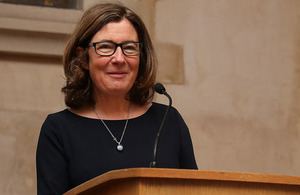Women’s Business Council celebrates five years of world-leading collaboration between business and government
The ‘Five years on’ report finds more women in work, remaining in work and progressing to senior positions, than in 2013.

Baroness Williams
Today (26 November) the government-backed Women’s Business Council (WBC) launched its ’Five years on’ report on progress in business and society for women.
The report sets out that over the past five years:
- Women’s salaries have increased by 11.2% compared to a 9.5% increase for men
- There has been an 11.4% increase in the number of entries to STEM A-Levels by girls since 2013, with 11,000 more women entering STEM A-levels
- 35.5% of managerial roles are now filled by women
- More than 30% of FTSE 100 board positions are occupied by women, compared to 20% in 2013
- There are more women in employment: 15.2 million women (aged 16+). This is an increase from 68% in 2014 to 71% in 2018
- The gender pay gap has fallen from 19.7% in 2013 to 17.9% in 2018
The Women’s Business Council (WBC) is an independent business-led initiative, set up by now Prime Minister Theresa May in 2012, and backed by the Government Equalities Office.
It produced its first report a year later structured around five key themes: raising girls’ aspirations to consider careers in STEM roles; improving the talent pipeline from the classroom to the boardroom; opening up opportunities for older working women; increasing the number of female entrepreneurs; and, engaging more male business leaders.
After that first report, the WBC’s work was extended to oversee progress against its recommendations for business.
Minister for Equalities Baroness Williams said:
“Today’s report highlights just how far we have come over the last five years, with the government’s introduction of 30 free childcare hours, opportunities for Shared Parental Leave, flexible working and mandatory gender pay reporting, really shaping the face of the modern workplace across the UK.
“The Women’s Business Council has been at the forefront of promoting change, showcasing those companies that are breaking down barriers to support women’s progression within the workplace. This is good news for business and good news for women.”
Chair of the Women’s Business Council Dame Cilla Snowball DBE said:
“We are delighted to see the publication of our latest annual progress report, shining a spotlight on our work to maximise women’s contribution to the economy.
“The Women’s Business Council has always understood that organisations and sectors face their own unique challenges when tackling the issues around the gender pay gap.
“We have advocated from the very start that organisations can learn from each other on best practice and measures that have been effective – to ensure their own actions to close these gaps are targeted, evidence-based and integrated.
“We hope the changes we have witnessed over the past five years have started to level the playing field within the workplace for women and men and that they will accelerate in future.”
The report was launched at the WBC’s Annual Awards ceremony at Guildhall’s Livery Hall in the City of London, celebrating leaders in business and society who have pioneered gender equality within the five core work areas of the WBC.
WBC 2018 Award Winners include:
- Starting Out: Dr Karen Sutherland, Astrazeneca
- Getting On: Clare Frances, Willmott Dixon
- Staying On: Professor Jo Brewis, Open University
- Men as Change Agents (MACA) for Gender Equality: Ivan Menezes, CEO for Diageo and Conrad Langworthy, Sky
- Enterprise: Check Warner, Founder of Diversity VC
- Returners – a new award for 2018: Karen Mattison, Timewise
For the first year a returners award will also be given, recognising Karen Mattison from Timewise, for her work in supporting women and men who have had a career break to accommodate caring responsibilities, to return to the workplace.
Notes for editors:
- The WBC is currently chaired by Dame Cilla Snowball DBE, Group Chairman and Group Chief Executive of AMV BBDO
- The WBC was set up in 2012. It aims to encourage action within business to implement the recommendations outlined in their 2013 report
- Through these recommendations the WBC believe that we have the opportunity to raise aspirations and allow talented people to reach their long term potential – ultimately, this will improve the talent pipeline and drive economic growth, positioning the economy for success
- In 2016 the WBC was expanded, to include more male leaders for gender equality and industries with a traditional underrepresentation of women
- Over the past two years the WBC has produced seven best practice toolkits for large and small businesses alike to support women across the employment lifecycle and as entrepreneurs and to highlight the role of men in joining the fight for greater gender equality:
- Balance the System: How to increase gender diversity to accelerate business growth (2018)
- Inspiring the next generation: engaging young people in Science Technology, Engineering and Mathematics (2018)
- Men as Change Agents: Achieving gender balance in business leadership and closing the gender pay gap (2018)
- Returners: a toolkit for Employers (2018)
- The Age of Success (2017) tips on managing a multigenerational workforce
- The Pipeline Effect (2017) a toolkit for enabling gender parity beyond middle management positions through role modelling, flexible working and supportive line management
- COMEBACK (2017) a toolkit for HR directors on considerations for starting older apprenticeship, returner and alumni programmes designed to support individuals back into the workplace after a career break